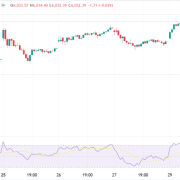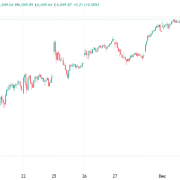
China’s economic outlook has grown increasingly uncertain in recent months as key indicators continue to disappoint.
With industrial output, retail sales, and property investment all showing signs of weakness, doubts are mounting over whether Beijing can hit its target of 5% GDP growth for 2024.
While many economists have called for urgent government intervention, China’s policymakers appear hesitant to deploy large-scale stimulus, raising questions about the country’s ability to navigate its current challenges.
Growth prospects are becoming unrealistic
China’s economy, once the powerhouse driving global growth, is experiencing a marked deceleration. The latest data for August revealed a broad-based slowdown that has alarmed analysts and policymakers alike.
Industrial output growth, a key measure of the country’s production capacity, fell to a five-month low of 4.5% year-on-year.
This marks the fourth consecutive month of slowing industrial activity, signaling that China’s once-robust manufacturing sector is losing momentum.
Retail sales, another crucial indicator of domestic demand, grew by only 2.1% in August, a sharp decline from the 2.7% growth recorded in July. Economists had predicted a figure closer to 2.68%, making the result even more concerning.
The weak retail performance points to a cautious consumer base, with discretionary spending categories like gold, jewelry, cars, and cosmetics particularly hard-hit.
Perhaps most troubling is the ongoing property market crisis. Property investment, which has long been a key driver of China’s economic growth, dropped by 10.2% year-on-year in the first eight months of 2024.
Home prices fell at their fastest rate in over nine years in August, with only two of 70 surveyed cities reporting gains.
The persistent slump in the property sector has left the economy struggling to regain its footing, contributing significantly to the broader slowdown.
No promising signs to be found
The slowdown in industrial production and retail sales is accompanied by rising unemployment, further complicating China’s economic recovery. The urban unemployment rate ticked up to 5.3% in August, the highest in six months.
This rise in joblessness, combined with tepid wage growth, has weighed heavily on consumer confidence, stifling any potential rebound in household spending. Private investment has also taken a hit.
Fixed-asset investment, which includes spending on infrastructure, manufacturing, and property, grew by just 3.4% year-on-year in the first eight months of 2024, down from 3.6% in the previous month.
More worryingly, private investment actually turned negative, dipping by 0.2% from a year earlier. Analysts attribute this to a cautious sentiment among investors, who are wary of sinking capital into an economy that appears to be losing steam.
The weak investment figures have prompted economists to lower their forecasts for China’s full-year GDP growth.
Goldman Sachs recently downgraded its projection to 4.7%, while Morgan Stanley and Bank of America have also cut their estimates to 4.7% and 4.8%, respectively.
These revised forecasts fall short of Beijing’s 5% target, raising questions about the government’s ability to meet its economic goals without more aggressive policy action.
Will Beijing step in with major stimulus?
As the economic data continues to worsen, calls for government intervention have grown louder.
Analysts have argued that without a significant fiscal or monetary stimulus package, China’s economy may continue to slow, further distancing itself from the government’s growth target.
However, Chinese authorities have so far been reluctant to take bold action.
Eswar Prasad, a professor of economics at Cornell University, criticized Beijing’s slow response, noting that “using monetary policy requires fairly significant action, and it also requires early action.”
Many believe that China’s policymakers have missed opportunities to stimulate the economy, especially in the face of mounting challenges such as an aging population, high levels of debt, and the ongoing property bust.
While China has managed to avoid a full-blown financial crisis, thanks to its efforts to insulate the housing market from the broader financial system, the country is still undergoing a slow and painful adjustment.
Without a major policy shift, the adjustment process could drag on for years, stifling growth and limiting China’s ability to contribute to global economic expansion.
Is There Still Hope for Recovery?
Despite the negative data, some analysts remain cautiously optimistic about China’s longer-term prospects.
For instance, while retail sales and industrial output have slowed, the country has not yet experienced the kind of systemic financial collapse seen in other major housing downturns, such as the US subprime crisis or Japan’s property crash in the 1990s.
This relative stability suggests that China may be able to navigate its current challenges without triggering a broader financial crisis.
Furthermore, there are signs that the government may be preparing to roll out more targeted policies to stabilize growth.
Chinese President Xi Jinping recently called on officials to “strive to fulfill the economic and social-development goals for the whole year.”
This has fueled speculation that Beijing could introduce more aggressive measures in the coming months, especially as the year-end approaches and the pressure to meet the 5% growth target intensifies.
That said, time is running out. Without a significant stimulus push, analysts like Lynn Song, chief economist for Greater China at ING, believe it will be “challenging” for China to reach its growth target.
Song emphasized that “time is running low for policymakers to introduce measures to buoy the economy amid numerous headwinds.”
The window for effective action is closing, and the government will need to act quickly if it hopes to reverse the current slowdown.
The post Is there still hope for China’s economy? appeared first on Invezz









